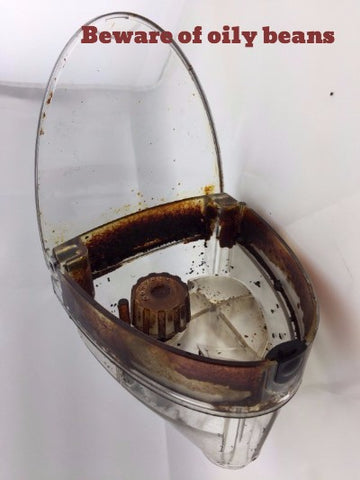How Oily Coffee Beans Can Ruin Your Espresso Machine and Coffee Taste
May 30, 2019
An espresso coffee is comprised of two simple ingredients: coffee beans and water. Ensuring you are using high quality coffee beans and water are paramount to achieving a great tasting espresso. But did you know that the quality of the coffee beans you use also plays a key role on how well your espresso machine works?
Read on to learn how using oily coffee beans can not only impact coffee taste but can also impact how your coffee appliance operates.
Coffee Roasts- What You Should Know
Let’s start by saying that there are no such thing as "espresso beans". They are only coffee beans. What distinguishes coffee beans is their roast. Roasted coffee beans can range from light to dark.
Technically speaking, any bean can be used to make an espresso – espresso is a coffee brewing method. However, in order to achieve the rich, deep, bold, and smooth taste that defines an espresso, the beans used need to be roasted from medium to medium-dark range. It is this type of roast that will produce what we consider an espresso complete with a rich, velvety crema.

This roasting chart is used by Espresso Canada on their coffee bags to show how dark each blend is roasted. Pictured is is
Click here for a guide on how to read a coffee bag label.
The problem lies in that there are many coffee roasters that produce coffee roasts and label them as "espresso beans". The unknowing consumer will choose this product thinking it is suitable for their espresso machine. However, when they open the bag they may find overly dark roasted coffee beans which are oily and will definitely wreak havoc on espresso machines with prolonged use.
There are two main problems with really dark roasts:
- Dark roasts have significant surface oil; and
- Dark roast make your coffee taste burnt, smokey, and bitter.
Understanding the Coffee Roasting Process
All coffee beans start off green. As they roast, their colour will change depending on the length of time they roast and the temperature at which they roast. As coffee beans roast, they begin to release oils. The darker the roast, the more surface oil the bean will have. Therefore, very dark roasts will be extremely oily. In fact, they will look and feel greasy.
This residual oil found on the surface of the beans will cling to your machine components and herein begins the problem. Those oils, over time, will compromise how your espresso machine works. Additionally, those very dark roasts will taste very burnt and bitter. Oil becomes rancid over time and the foul taste is partly due to rancid oil build up. Those who insist they don’t like espresso have often only tried espresso made with overly roasted coffee beans or from a machine that needs some maintenance. Who likes a burnt and bitter aftertaste?

How do oily beans affect espresso machines?
Overly roasted beans are oily and leave a greasy residue on all your machine components. Picture the bottom of. a frying pan that has residual oil on its' surface. You know how hard it is to clean, right? The same holds true for espresso machines. Overtime the residual oil from the oily coffee beans becomes gummy and sticky and will adhere to your machine's components. The longer the oils remain on the surface the harder they are to clean completely.
Here are some issues that will occur if you use over oily coffee beans in your espresso machine. You may notice:
- Sticky bean hoppers which will impede coffee beans from flowing smoothing into the grinder.
- Machine grinders will become gummed up causing coffee grounds to stick together and become solid and clay like.
- Screens on brew units, portafilters, or even mocha pots will become clogged and the machine will struggle to produce a coffee or the coffee will flow out painstakingly slow.

Here is a bean hopper on a superautomatic espresso machine that has an oily residue from the use of oily coffee beans.
If you use oily coffee beans on your espresso machine, it will not be a matter of if your machine needs servicing, but when. So if you have been using oily beans, be sure to get your machine thoroughly cleaned by an authorized service centre and use the right beans moving forward.

Here is a screen from a brew unit on a Saeco espresso machine that is clogged due to use of oily coffee.
How will oily beans affect the taste of your coffee?
In addition to the coffee tasting burnt because the beans are over roasted, the oils that build up on machine components will become rancid over time.
Rancid oil is sure to produce make a foul tasting coffee. This will certainly leave an unpleasant aftertaste.
What to look for in coffee beans for an espresso machine
When choosing beans for your espresso machine or any coffee appliance consider the following:
- The roast: you want medium to medium dark roasts. Don’t assume that beans labelled espresso are necessarily the correct roast.
- The look and feel of the beans: If you can visually see an abundance of oil on the surface of the beans and they feel oily, then they are not ideal for your espresso machine.
- Coffee Blends: each bean varietal responds uniquely to the roasting process. Some varieties will naturally produce more oils. Buying coffee blends helps to balance the amount of oil in the beans. Some oil in coffee beans is important because it adds to the flavour and body of the coffee it will produce. The beautiful crema, a hallmark of a good espresso is also a result of emulsified oils.
Popular coffee bean brands that are generally oily
In my 30+ years experience in the sales and service of super superautomatic espresso machines, there are a couple of brands that seem to be primary culprits when it comes to surface oil and the impact on the functionality of espresso machines.
Starbucks Brand and Kirkland Espresso Brand are brands two brands to avoid.
I won’t give my personal opinion on the taste of these beans because taste, after all, is a matter of personal preference...but I can report that clients who bring in their machine for servicing report they have used these two brands of coffee beans. Usually, their machines need servicing for issues as described above.
Espresso Canada's Coffee Bean Collection
Here is a shameless plug for our coffee beans sold under our label. These beans are ideal for all coffee brewing methods (espresso, siphon, pour over, aeropress, percolators),but they have been specifically blended for use in stove top, manual or superautomatic espresso machines. These beans are particularly ideal for brewing espresso but the fact of the matter is they are great for all brewing methods. The medium to medium dark roasts produce a rich complex with a smooth mouthfeel. The coffee produced in other brewing appliances may be bolder than what you are used to but customers report they never loved their coffee much more after using Espresso Canada coffee beans.

Of course our beans are blended specifically for the use in espresso machines- the coffee our blends produce is smooth, sweet, and velvety. It is worth giving it a try. These beans have been blended specifically to minimize issues related to coffee oils in espresso machines.
What to do if you have been using oily coffee beans
If you have been using overly oily coffee beans, use a vacuum to remove beans from the bean hopper. Depending on how long you have been using oily beans, you may need to engage the services of a certified service centre to give your machine a deep cleaning and overhaul.
It is important to determine if any components have been compromised and change those parts. Understanding how to proply clean and maintain your coffee machine is really important. Click here to download a FREE step by step guide on cleaning and maintaining a superautomatic espresso machine with a removable brew unit like those by Saeco / Philips.
The most important thing is to stop using oily beans right away.
Why avoid oily coffee beans in your espresso machine?
In short, oily beans will affect the taste of your espresso and more importantly, overtime, oily coffee beans will compromise how your machine operates. Continuing to use oily beans can result in costly repair bills and down time for your machine. The latter point is the most concerning because who even wants to consider a morning without your favourite brew.
Here is what one coffee lover said about using oily coffee beans:

Contact us if your machine needs servicing or if you want any other information about coffee beans or espresso machines. We are happy to help.





6 comments
I am used to and love Second Cup dark (oily!) roast flavour. What to do? Don’t want to ruin my grinder and espresso machine. Will I get same flavour from your dark roast?
This is absolute B.S. Some dark roasts are oily and it’s natural phenomenon. Your machine and its components will require more regular cleaning. That’s all. Stop publishing garbage like this.
My old deLonghi machine which I had for 15 years and never had a problem with Starbucks expresso beans, Now my new one keeps breaking down from those beans and I now know why. The manufacturers say nothing of this in there books.